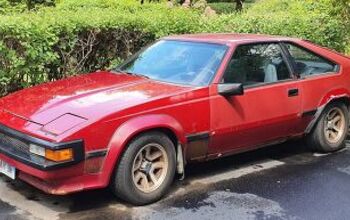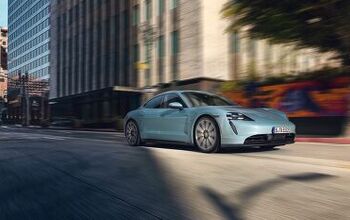Ailing Motorcycle Industry Could Be Canary in Coal Mine for Automakers - Part Two

Last week, we discussed how the motorcycle industry’s total failure to entice new riders for over a decade has come back to bite it in the ass. Two-wheeled ownership declined drastically in the United States after the Great Recession and never really bounced back. Blame a disinterested population of youngsters with less discretionary funds and few entry-level options to consider.
I speculated that automakers could be on a similar path, despite the passenger car segment being more of a necessity for average commuters and less apt to collapse outright. But that isn’t to presume they might not be subject to similar pitfalls, and we’ve a new one to consider. Harley-Davidson, which serves as the poster child for the motorcycle industry’s current crisis, recently announced it will end all U.S. production of motorcycles sold in Europe.
Those bikes will now be manufactured overseas. The company said in a regulatory filing with the U.S. Securities and Exchange Commission that retaliatory tariffs levied by the European Union on motorcycles exported from the U.S. jumped from 6 percent to 31 percent. Harley-Davidson’s already expensive products come at an additional premium in Europe, and the the company estimates the new fines will add another $2,200 per motorcycle, on average.
President Trump issued a response to the decision on Monday, saying the company surrendered and “waved the white flag.”
Still, he acknowledged that the company issued plans to move Kansas City production to Thailand prior to the global trade war. In fact, H-D has assembled its newer mid-sized bikes in Bawal, India for years. Those models were intended as an entry point for new rides, part of a plan to expand sales in the developing world. Keen to preserve its image of “American Made” motorcycles at home, the brand also launched domestic assembly of its 500 and 750cc Street models for the North American market.
“A Harley-Davidson should never be built in another country-never! Their employees and customers are already very angry at them,” Trump tweeted. “If they move, watch, it will be the beginning of the end – they surrendered, they quit! The Aura will be gone and they will be taxed like never before!”
According to the Associated Press, Harley said global tariffs left it with few alternatives if it wants to remain competitive in the European market. “Increasing international production to alleviate the EU tariff burden is not the company’s preference, but represents the only sustainable option to make its motorcycles accessible to customers in the EU and maintain a viable business in Europe,” the company said in a prepared statement.
That’s the lesson to take take away from this. While the escalating trade war aims to protect domestic jobs and give other tariff-happy nations a taste of their own medicine, there are consequences. Harley hasn’t elaborated on job losses in the U.S., but it’s difficult to imagine the situation not resulting in staffing cuts. Numerous outlets are already faulting the Trump tariffs with future H-D layoffs, but let’s not forget the company already culled its workforce once this year and has been mulling plans to move some manufacturing out of the U.S. It’s equally plausible that the company is using the tariffs as a convenient excuse.
As always, getting to the truth means peering into the fog. However, even if Harley-Davidson was committed to moving production out of America, the escalating trade war definitely didn’t help change its mind.
Let’s bring the automotive industry back into the mix. Since automakers (the executives, not the engineers) predominantly care about shareholders and stock value, it would be stupid to presume they wouldn’t follow Harley’s lead on this. While tariffs may force some companies to build here, they also have the perfect excuse to build somewhere cheaper and exclude less-popular models from domestic lineups to save money. Ford’s already planning on trimming its passenger car lineup in the U.S., and you had better believe where the majority are built has something to do with that.
Tariffs seriously screw with the global supply chain. What’s happening with American motorcycles in Europe could also happen with American-built autos if the trade war escalates. Trump has already said he’d put a 20-percent tariff on European cars.
“Tariffs on imported cars, parts would be broadly credit negative for industry,” Moody’s Investors Service advised on Monday. “A 25-percent tariff on imported vehicles and parts would be negative for nearly every segment of the auto industry — carmakers, parts suppliers, car dealers, and transportation companies … Should any tariffs be levied, carmakers would need to absorb the cost to protect sales volumes while hurting profitability; increase prices to pass the tariff costs to customers, which could hurt sales; or a combination of both.”
To translate, domestic automakers will need to account for the cost of scaling back their foreign production. How they do that is up to them, but we’ve already seen how Harley-Davidson handled it. That’s a worst case scenario, of course. Ford and General Motors aren’t in the same situation as a motorcycle company that’s been hemorrhaging sales for a while. But automakers have a lot of eggs in a multitude of baskets and the automotive sector isn’t in peak condition right now, either. It’s often the weaker species that die out first when a ecosystem is being decimated.
Tariffs may be the way to go to ensure long-term domestic investment, at least while the United States remains such a profitable market. There’s also the chance that China or Europe will bend to the pressure or extend an olive branch by trying to negotiate. However, that doesn’t appear to be anyone’s strategy at the moment. And short-term implications could hamper automakers’ ability to conduct business normally. Hell, maybe the industry needs a swift kick in the groin. I just hope it can regain its composure after it crawls off the carpet.

A staunch consumer advocate tracking industry trends and regulation. Before joining TTAC, Matt spent a decade working for marketing and research firms based in NYC. Clients included several of the world’s largest automakers, global tire brands, and aftermarket part suppliers. Dissatisfied with the corporate world and resentful of having to wear suits everyday, he pivoted to writing about cars. Since then, that man has become an ardent supporter of the right-to-repair movement, been interviewed on the auto industry by national radio broadcasts, driven more rental cars than anyone ever should, participated in amateur rallying events, and received the requisite minimum training as sanctioned by the SCCA. Handy with a wrench, Matt grew up surrounded by Detroit auto workers and managed to get a pizza delivery job before he was legally eligible. He later found himself driving box trucks through Manhattan, guaranteeing future sympathy for actual truckers. He continues to conduct research pertaining to the automotive sector as an independent contractor and has since moved back to his native Michigan, closer to where the cars are born. A contrarian, Matt claims to prefer understeer — stating that front and all-wheel drive vehicles cater best to his driving style.
More by Matt Posky
Latest Car Reviews
Read moreLatest Product Reviews
Read moreRecent Comments
- ToolGuy 9 miles a day for 20 years. You didn't drive it, why should I? 😉
- Brian Uchida Laguna Seca, corkscrew, (drying track off in rental car prior to Superbike test session), at speed - turn 9 big Willow Springs racing a motorcycle,- at greater speed (but riding shotgun) - The Carrousel at Sears Point in a 1981 PA9 Osella 2 litre FIA racer with Eddie Lawson at the wheel! (apologies for not being brief!)
- Mister It wasn't helped any by the horrible fuel economy for what it was... something like 22mpg city, iirc.
- Lorenzo I shop for all-season tires that have good wet and dry pavement grip and use them year-round. Nothing works on black ice, and I stopped driving in snow long ago - I'll wait until the streets and highways are plowed, when all-seasons are good enough. After all, I don't live in Canada or deep in the snow zone.
- FormerFF I’m in Atlanta. The summers go on in April and come off in October. I have a Cayman that stays on summer tires year round and gets driven on winter days when the temperature gets above 45 F and it’s dry, which is usually at least once a week.

































Comments
Join the conversation
I read a lot on here about other countries do not buy American vehicles. There is a reason for this that has nothing to do with tariffs or taxes. Europe and Japan both have vehicles made for their conditions. American cars are not made for tight city streets and tight mountainous roads. American cars are made for interstate travel with no turns for miles and cities that are wide open and made for cars. Also whether it is just perception or fact American cars have the reputation of poor quality. England and Japan both require right hand drive cars that American companies will not make. When you add it all up, there is no reason for anyone from Europe or Japan to prefer any American car to what they have at home. Until the American car companies begin to be serious about selling cars overseas, they will not sell cars overseas. It is a long process to reverse the ideas that foreigners have about American cars and it will not be easy to do. General Motors has simply quit trying to sell cars in Europe. Ford recently dropped trying to sell cars in Japan. FCA is the only company selling any number of cars around the world and that is because of the Fiat nameplate. The whole problem of America having a deficit to other countries occurs because of the same ideas. America does not try to sell anything to other countries that is adapted to their needs and wants. People think that if it is good enough for Americans, it is good enough for anyone. This is not so. Would you buy something that is only part of what you want, against something that is tailored to your tastes and wants? Foreign companies look long and hard at what they are selling in the US and try to make it more desirable for the consumer. American companies do not seem to look at what the foreign customer wants at all. They simply put out what they already have out there and try to sell it. Competition is getting stronger all over the world and half assed measures will not do any more. If America is going to thrive, it must do more to compete and not just say here it is, come and get it.
If Harley Davidson is in trouble, I have to wonder about the future of Indian Motorcycle. They were reborn just as the big bike fad was taking off among lawyers and investment bankers, but seemed to spend time opening restaurants (not kidding) and incredibly expensive dealerships and they don't have nearly the brand equity HD does. I suspect their name will be in the obits before long.